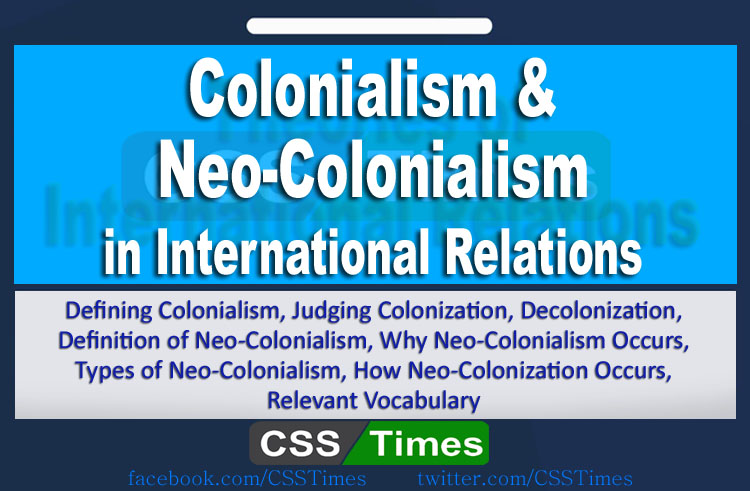Colonialism & Neo-Colonialism in International Relations
Colonialism is an elusive concept. It is a political, a legal, an economic, a cultural and a social phenomenon, which does not lend itself to a short and clear definition. While colonizing states refrained from defining colonialism, many scholars of various disciplines have written about the subject.
According to the Oxford English Dictionary, the mid-14th century “colonye” was used to describe the Roman settling, creating outposts, or occupying lands outside the Roman city-state. Colonialism emerged around the 19th century to reify a European practice that was becoming prevalent across the world.
Defining Colonialism
The element of ‘alien domination’ appears to be at the heart of the colonial experience. Colonialism is foreign rule imposed upon a people. Colonialism is a system in which a state claims sovereignty over territory and people outside its own boundaries, often to facilitate economic domination over their resources, labor, and often markets.
Colonialism can be defined as rule over people of different races living in separate lands by a single colonial power. Colonialism also refers to a set of beliefs used to legitimize or promote this system, especially the belief that the values and systems of the colonizer are superior to those of the colonized. Colonialism can thus be seen to imply domination of an alien minority asserting racial and cultural superiority over a materially inferior majority. Hobson describes colonialism „in its best sense‟ as the natural outflow of nationality, its test is the power of the colonizer to transplant the civilization they represent to a new social and cultural environment.
Judging Colonization
Defenders of colonialism argue that colonization developed the economic and political infrastructure necessary for modernization and democracy (they point to former colonies like Singapore as examples of post-colonial success).
Post colonialist such as Franz Fanon argue that colonialism does political, psychological, and moral damage to the colonized as well.
Let us consider the case of British colonist for example. The British Empire, in the early decades of the 20th century, held sway over a population of 400-500 million people – roughly a quarter of the world’s population – and covered roughly two-fifths of the world’s land area.
The British Empire came together over 300 years through a succession of phases of expansion, interspersed with intervals of pacific commercial and diplomatic activity, or imperial contraction. Its territories were scattered across all parts of the world, and it was described with some truth as “the empire on which the sun never sets”. The Empire facilitated the spread of British technology, commerce, language, and government around much of the globe. Imperial hegemony contributed to Britain’s extraordinary economic growth, and greatly strengthened its voice in world affairs. Even as Britain extended its imperial reach overseas, it continued to develop and broaden democratic institutions at the homeland.
From the perspective of the colonies, the record of the British Empire is mixed. The colonies received from Britain the English language, an administrative and legal framework on the British model, and technological and economic development. During decolonization, Britain sought to pass parliamentary democracy to its colonies, with varying degrees of success.
British colonial policy was always driven to a large extent by Britain’s trading interests. While settler economies developed the infrastructure to support balanced development, tropical African territories found them developed only as raw-material suppliers. A reliance upon the manipulation of conflict between ethnic and racial identities, in order to keep subject populations from uniting against the occupying power – the classic “divide and rule” strategy – left a legacy of partition or inter-communal difficulties in several parts of the world including the Subcontinent.
Check Also: Balance Of Power (BOP) Theory in International Relations | CSS Notes
Decolonization
Decolonization is the antithesis of colonization. While anti-colonialist feeling first manifested in the 18th c. (in the US), decolonization is a product of the post-WW II period. Nationalism in Latin America, Asia and Africa, as well as the weakening of the colonial powers helped achieve decolonization.
The UN played an important role in ending colonial rule in Indonesia and certain African colonies. It particularly helped decolonize Liberia, Somalia and Eritrea from Italy.
Definition of Neo-Colonialism
Neo-colonialism implies political control of an underdeveloped people whose socio-economic life is directed by a former colonizer. Dependency theorists such as Andre Gunder Frank argued that neocolonialism leads to net transfer of wealth from the colonized to the colonizer, inhibiting successful development.
The essence of neo-colonialism is that the state, which is subject to this phenomenon, is in theory independent and has all outward trappings of international sovereignty, but in reality its economic system and its political policy is directed from the outside.
The 3rd All Parties African People‟s Conference held in Cairo in 1961 described Neo-Colonialism as: “the economic infiltration by a foreign power after independence, through capital investment loans and monetary aids or technical experts, of unequal concessions, particularly those extending for long periods”.
Why Neo-Colonialism Occurs
Weakness and growing resentment after WWII made direct colonization impractical. Previously united colonial territories were divided into mostly unviable states, compelling them to depend on their former colonial powers for economic and defense needs
To fund welfare policies within their own countries, former colonial powers needed resources, which were easy to generate through former colonies still reliant on them, thus encouraging neo-colonial ties to develop.
Types of Neo-Colonialism
Economic Dependencies: control over financial strings of a nation allows control over its political and social institutions as well.
Satellites: formal independence but political and economic control still exercised by colonial power. Control exercised by colonial power over a satellite is more extensive than that exercised by imperial states.
How Neo-Colonization Occurs
Former colonies are particularly prone to become economically dependent on colonial powers due to its capital investments, financial loans, and because of unequal exchange of goods and resulting trade imbalances. Technological dependency on former colonial powers enables retaining control over prior colonies. Military presence in the form of bases also helps exert and retain control of former colonies.
Critics of Neocolonialism allege that both nations and corporations have aimed to control other nations through indirect means; that in lieu of direct military or political control, neocolonialist powers e mploy economic, financial and trade policies to dominate less powerful countries. Those who subscribe to the concept maintain this amounts to control over targeted nations. They portray the choice to grant or to refuse granting loans, especially by international financial institutions such as the IMF and World Bank, as a decisive form of control. They argue that in order to qualify for these loans (as well as other forms of economic aid), weaker nations are forced to take steps favorable to the financial interests of the IMF/WB, but detrimental to their own economies, increasing rather than alleviating their poverty.
Critics of neocolonialism also attempt to demonstrate that investment by multinationals enriches few in underdeveloped countries, and causes humanitarian (as well as environmental and ecological) devastation to the populations which inhabit ‘neo-colonies.’ This, it is argued, results in perpetual underdevelopment; which cultivates those countries as reservoirs of cheap labor and raw materials, while restricting their access to advanced production techniques to develop their own economies. By contrast, critics of the concept of neocolonialism argue that, while the developed world does profit from cheap labor and raw materials of developing nations, ultimately, it does serve as a positive force for development in developing countries of the Third World.
Relevant Vocabulary
Elusive: hard to describe
Refrain: desist or avoid
Antithesis: exact opposite
Infrastructure: established system (of communication for example)
Prevalent: widespread
Ecological: concerning the natural environment
Reservoir: stored amount
Inhabit: to populate or live in
Humanitarian: charitable or compassionate








